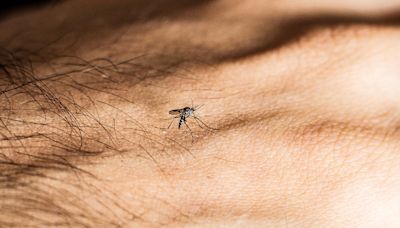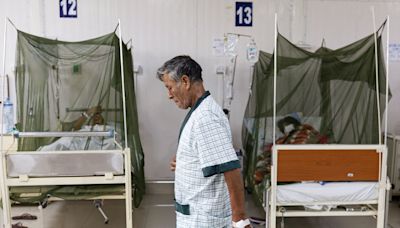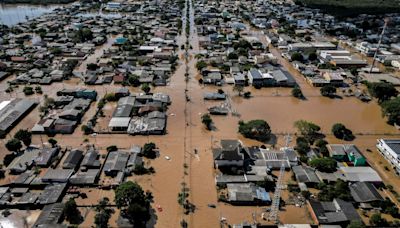Ad
related to: dengue fever outbreakRead About What Causes Respiratory Syncytial Virus (RSV) And Who Is At Risk. View Site. Learn The Answers To Common Questions About RSV. See Causes, Signs, And Symptoms.
- Learn About Symptoms
Discover Common Symptoms And
Find Information Online Now.
- See Signs & Symptoms Info
Are You At Risk For RSV?
Understand The Signs & Symptoms.
- Understanding RSV
Click Here To Learn More About RSV
At The Official Website. Visit Now.
- Have Questions About RSV?
Read Answers To Frequently Asked
Questions And Stay Informed Here.
- Can You Get RSV?
Older Adults Can Get RSV Too.
Click Here To Learn More Today.
- RSV Causes & Information
Read About The Virus That Causes
RSV And Learn Who Is At Risk.
- Learn About Symptoms
Search results
Apr 12, 2024 · What you need to know about the latest outbreak of dengue fever. Health Apr 12, 2024 2:42 PM EDT. Roughly 4.7 million people have been infected with dengue fever so far in 2024, an...
- Laura Santhanam
1 day ago · Latin America is experiencing its worst dengue fever outbreak on record. Case numbers in the first 4 ½ months of 2024 are already 238% higher than they were by this time last year, ...
Learn More. Symptoms of Dengue and Testing. About symptoms presented by dengue virus infection. Data and Statistics on Dengue in the United States. About facts and statistics related to dengue cases reported in the United States. Areas with Risk of Dengue. About areas around the world with risk of dengue and resources for travelers.
Oct 24, 2023 · Jaime Saldarriaga/Associated Press. By Stephanie Nolen. Published Oct. 24, 2023 Updated Feb. 10, 2024. Cases of dengue fever, a mosquito-borne viral illness that can be fatal, are surging...
- Key Facts
- Overview
- Symptoms
- Diagnostics and Treatment
- Global Burden
- Transmission
- Risk Factors
- Prevention and Control
- Who Response
Dengue is a viral infection transmitted to humans through the bite of infected mosquitoes.About half of the world's population is now at risk of dengue with an estimated 100–400 million infections occurring each year.Dengue is found in tropical and sub-tropical climates worldwide, mostly in urban and semi-urban areas.While many dengue infections are asymptomatic or produce only mild illness, the virus can occasionally cause more severe cases, and even death.Dengue (break-bone fever) is a viral infection that spreads from mosquitoes to people. It is more common in tropical and subtropical climates. Most people who get dengue will not have symptoms. But for those who do, the most common symptoms are high fever, headache, body aches, nausea, and rash. Most will get better in 1–2 weeks. Some people develo...
Most people with dengue have mild or no symptoms and will get better in 1–2 weeks. Rarely, dengue can be severe and lead to death. If symptoms occur, they usually begin 4–10 days after infection and last for 2–7 days. Symptoms may include: 1. high fever (40°C/104°F) 2. severe headache 3. pain behind the eyes 4. muscle and joint pains 5. nausea 6. v...
There is no specific treatment for dengue. The focus is on treating pain symptoms. Most cases of dengue fever can be treated at home with pain medicine. Acetaminophen (paracetamol) is often used to control pain. Non-steroidal anti-inflammatory drugs like ibuprofen and aspirin are avoided as they can increase the risk of bleeding. For people with se...
The incidence of dengue has grown dramatically around the world in recent decades, with cases reported to WHO increasing from 505 430 cases in 2000 to 5.2 million in 2019. A vast majority of cases are asymptomatic or mild and self-managed, and hence the actual numbers of dengue cases are under-reported. Many cases are also misdiagnosed as other feb...
Transmission through the mosquito bite The dengue virus is transmitted to humans through the bites of infected female mosquitoes, primarily the Aedes aegypti mosquito. Other species within the Aedes genus can also act as vectors, but their contribution is normally secondary to Aedes aegypti. However, in 2023, a surge in local transmission of dengue...
Previous infection with DENV increases the risk of the individual developing severe dengue. Urbanization (especially unplanned), is associated with dengue transmission through multiple social and environmental factors: population density, human mobility, access to reliable water source, water storage practice etc. Community risks to dengue also dep...
The mosquitoes that spread dengue are active during the day. Lower the risk of getting dengue by protecting yourself from mosquito bites by using: 1. clothes that cover as much of your body as possible; 2. mosquito nets if sleeping during the day, ideally nets sprayed with insect repellent; 3. window screens; 4. mosquito repellents (containing DEET...
WHO responds to dengue in the following ways: 1. supports countries in the confirmation of outbreaks through its collaborating network of laboratories; 2. provides technical support and guidance to countries for the effective management of dengue outbreaks; 3. supports countries in improving their reporting systems and capture the true burden of th...
Dec 21, 2023 · Recent data from 2023 emphasize escalated dengue outbreaks in several countries, particularly Bangladesh, Brazil, Burkina Faso, Fiji, Pakistan, the Philippines, and Viet Nam. Additionally, non-endemic countries are increasingly facing dengue as a significant public health concern.
Oct 5, 2022 · Dengue (DENG-gey) fever is a mosquito-borne illness that occurs in tropical and subtropical areas of the world. Mild dengue fever causes a high fever and flu-like symptoms. The severe form of dengue fever, also called dengue hemorrhagic fever, can cause serious bleeding, a sudden drop in blood pressure (shock) and death.
Ad
related to: dengue fever outbreakRead About What Causes Respiratory Syncytial Virus (RSV) And Who Is At Risk. View Site. Learn The Answers To Common Questions About RSV. See Causes, Signs, And Symptoms.





